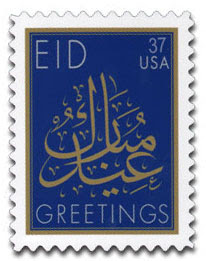Today is the first day that muslims worldwide will begin to celebrate Eid al-Fitr. Having just emerged from Ramadan, we are spiritually cleansed, disciplined, and refreshed. And eager to reacquaint ourselves with the concept of “lunch” !
 It’s a mark of the increasing contribution of muslim Americans to society and culture that Eid is commemorated not just by muslims ourselves, but also by our communities and government. One great example that I like to mention every year is the Eid stamp, issued in honor of Eid al-Fitr and Eid al-Adha by the US Postal Service. I wrote quite a bit about its history last year, which is really quite inspiring – the stamp was actually introduced on September 1st 2001, and given the events ten days later, was nearly canceled due to Islamophobic outcry. The stamp survived, in part because of the support of President Bush and then-House speaker Dennis Hastert, it must be noted. The White House website describes the artistic process that went into its creation:
It’s a mark of the increasing contribution of muslim Americans to society and culture that Eid is commemorated not just by muslims ourselves, but also by our communities and government. One great example that I like to mention every year is the Eid stamp, issued in honor of Eid al-Fitr and Eid al-Adha by the US Postal Service. I wrote quite a bit about its history last year, which is really quite inspiring – the stamp was actually introduced on September 1st 2001, and given the events ten days later, was nearly canceled due to Islamophobic outcry. The stamp survived, in part because of the support of President Bush and then-House speaker Dennis Hastert, it must be noted. The White House website describes the artistic process that went into its creation:
The Eid stamp, designed by Zakariya of Arlington, Va., features the
Arabic phrase “Eid mubarak” in gold calligraphy on a blue background.
English text on the stamps reads “EID GREETINGS.”Employing traditional methods and instruments to create this design, Zakariya chose a script known in Arabic as “thuluth”
and in Turkish as “sulus.” He describes it as “the choice script for a
complex composition due to its open proportions and sense of balance.”
He used homemade black ink, and his pens were crafted from seasoned
reeds from the Near East and Japanese bamboo from Hawaii. The paper was
specially prepared with a coating of starch and three coats of alum and
egg-white varnish, then burnished with an agate stone and aged for more
than a year.
Unfortunately the stamp was discontinued in 2002, despite the xenophobic campaign (which probably boosted sales rather than hurt them). Until last year, that is, when it was reintroduced, and the stamp is available again this year directly from the USPS Store online. Unfortunately, the stamp is only available as a $.41 denomination, so you will need $0.01 stamps as well for first-class mail. If enough people purchase the stamp every year, however, then the Postal Service may see fit to reissue the stamp in a “Forever” version. I urge everyone to buy a sheet of the Eid stamps from either the online store or your local post office branch to show our support and keep this wonderful artistic masterpiece alive.
The other great example of Eid celebration in my mind is a relatively new tradition – the lighting of the Empire State Building in green. Last year was the first year that the ESB decked out for Eid, and there are some beautiful photos online. Of course, this drove the usual suspects insane with anger, which was a bonus! 🙂 This year, the ESB will again be lighted in “the green glow of dhimmitude” as per the following schedule:
On this occasion, for the second year, the Empire State Building will
shine its world-famous tower lights in green on Tuesday, September 30
and Wednesday, October 1, 2008 for its annual celebration of
Eid-ul-Fitr. The lighting for Eid is an annual event in the same
tradition of the Empire State Building’s yearly lightings for Christmas
and Hanukah.We deeply appreciate this recognition of the American Muslim community
by one of the United States’ most cherished landmarks. In celebrating
together with the Muslims of New York City and the United States, the
Empire State Building once again shows itself to be a powerful symbol
in America’s most culturally vibrant city.
(above sent via email from the American Society for Muslim Advancement aka ASMA). If anyone can find pictures from tonight or tomorrow night’s lighting, please do leave a comment and I will post them here.
It is important that we muslim Americans not forget that despite the undercurrent of anger and hate that we sometimes have to traverse, as a rule we are a recognized and valuable part of our society. The examples above matter more than the actions of the diseased few. We belong here, and our Eid is everyone’s Eid, muslim or non-muslim alike.
